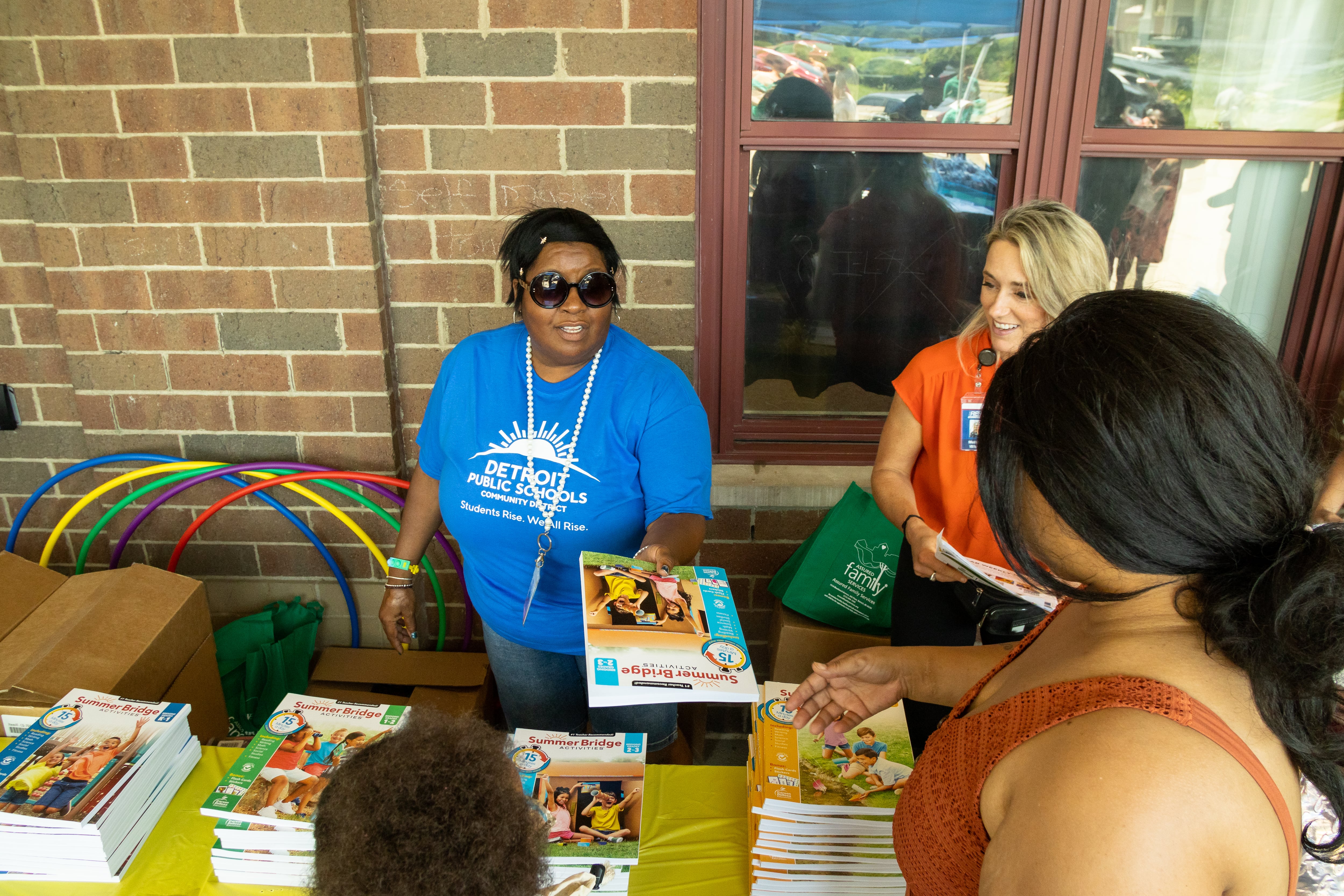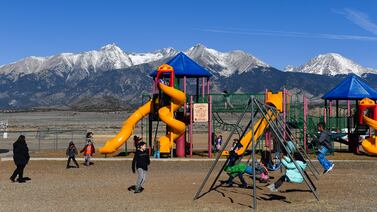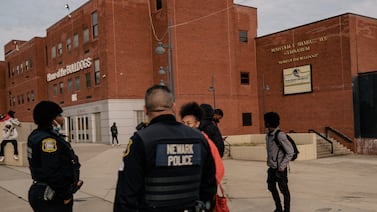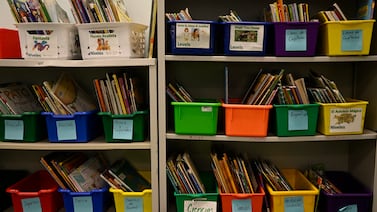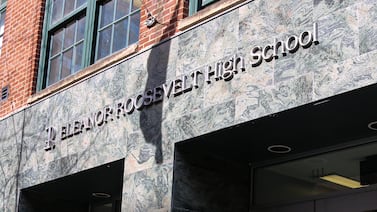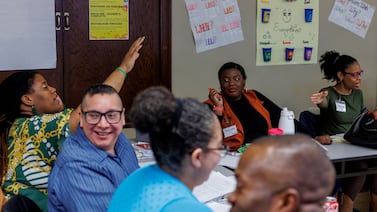As students returned to the classroom this fall, early data from Detroit’s public schools showed another enrollment decline — a consistent trend for the last three years.
Superintendent Nikolai Vitti said this month that about 51,600 K-12 students were enrolled in the Detroit Public Schools Community District, a decline from about 52,300 enrolled at the same time last year, and roughly 53,000 at the start of 2021-22.
The exodus of students during and since the pandemic underscores the need for the district’s continued focus on strategies to boost enrollment such as marketing campaigns, back-to-school fairs, and neighborhood canvassing.
Detroit’s charter schools are also working to recruit new students after seeing their enrollment decline. Grand Valley State University, which authorizes over 25 charter schools in Detroit, including networks such as University Prep and Covenant Schools, has reported a drop of roughly 800 students in its city charters since the pandemic began, according to a university spokesperson. That’s nearly a quarter of their enrollment: In the 2018-19 school year, the university’s charters had about 31,000 students.
District’s enrollment strategies are a mix of old and new
During a summer school board meeting, Vitti laid out district efforts to increase enrollment. During the height of COVID-19, DPSCD lost 3,000 students. But with federal relief aid, the district expanded outreach, home visits, and door-to-door canvassing strategies using staff and parent volunteers. Those efforts resulted in a gain of 1,000 students.
Vitti said the primary strategy DPSCD is implementing is its new pre-kindergarten expansion, which will add 17 pre-K classrooms at 12 schools across the city this school year, including Barton Elementary, Garvey Academy, and Nolan Elementary-Middle School. While the district does not offer transportation for pre-K, families can arrange to have their children ride the bus with an older sibling who is eligible for transportation, Vitti said.
During a June board meeting, the superintendent said the district will annually monitor its preschool expansion “over the next three to four years” to determine whether actual enrollment numbers match projections, and whether it sees high reenrollment rates from pre-K to kindergarten. DPSCD’s K-12 enrollment is projected to remain constant next year, according to Vitti, with a potential bump of 335 pre-kindergarten students.
Vitti told BridgeDetroit this month that the district is already seeing growing demand for pre-K classrooms.
“As they move into kindergarten, most DPSCD pre-K families choose to continue their education in the district,” he said. “We’ve also seen that students who participate in our pre-K programs perform better academically. This year, students who were enrolled in our pre-K classes scored higher on math and reading tests in kindergarten than those who did not participate in our pre-K programs. By expanding our pre-K programs, we can engage more families early, find them a home in the district, and help them to build foundational academic and social-emotional skills that support them through their K-12 journey.”
Other methods include continuing with radio, TV, and billboard marketing campaigns as well as canvassing schools with low enrollment, Vitti said.
DPSCD also hosted Back-to-School Expos at dozens of schools, with most offering enrollment opportunities, school tours, food, and games.
Wanda Walker was among the caregivers who attended an expo at Marion Law Academy last month, a K-8 school on Detroit’s east side.
Walker’s 4-year-old great-grandson Noah Walker is a kindergartner at the school, while her 12-year-old granddaughter Autumn Walker recently started seventh grade.
While her grandchildren could have gone to a charter school or a school outside the city, Walker said having Marion Law located across the street from her house makes it convenient.
Detroit’s roughly 100,000 public-school students are widely dispersed across a mix of charters, traditional neighborhood schools, and application schools, with nearly 50% of children attending charter schools. Students from the city are also attending neighboring school districts through Schools of Choice of programs.
Walker said she’s active in the school community as a member of the parent-teacher association and has gotten to know the teachers and families at the school.
“Being a part of the community, I feel like I’m giving back,” said Walker, who is the primary caregiver for her grandchildren.
Major cities nationwide see decline in school enrollment
As of the end of 2022-23, DPSCD had a little more than 48,000 students — down from 51,000 before the pandemic.
Cities across the country, including New York, Chicago, and Denver, have lost enrollment in their public schools, too. This decline may well continue and even accelerate in coming years because of demographic trends, Chalkbeat has reported.
Between the middle of 2020 and 2021, large urban areas experienced a 3.7% decline in the number of children under age 5 and a 1.1% dip in the number of children 5 to 17 years old, according to a 2022 report from the Economic Innovation Group, a bipartisan public policy organization.
Each year, DPSCD officials share enrollment and attendance data from the first couple weeks of the new school year. These numbers provide an early gauge of enrollment patterns ahead of Michigan’s two official Count Days, in October and February, when the number of students attending school is tallied for the purposes of allocating state funding.
Enrollment numbers can fluctuate over the course of the year as families move into and out of the city, or send their children to different schools, even after initially enrolling in DPSCD. The district’s K-12 enrollment of about 48,000 at the end of last year was about 4,000 below the figure of the start of the year.
Recent data from the U.S. Census Bureau found Detroit lost roughly 8,000 residents from 2021 to 2022 — a figure Mayor Mike Duggan has publicly contested, suggesting the city’s population has been undercounted.
The city’s population decline and decrease in school enrollment affected DPSCD’s budget for this school year, which saw more than 300 job cuts for central office positions and support staff including deans, assistant principals, college transition advisers, school culture facilitators, and kindergarten paraeducators. However, most people in those support staff jobs were able to transfer to a different position in the district.
Vitti said budget cuts were necessary due to many challenges the district is facing in addition to enrollment, such as the end of federal COVID relief funding, increases in employee salaries, health care costs, and inflation.
Canvassers worked through the summer
DPSCD is also targeting schools with low enrollment, such as Carstens Academy of Aquatic Science, Nolan Elementary-Middle School, Mark Twain School for Scholars, and Detroit International Academy for Young Women. The district’s Office of Family and Community Engagement has been leading the canvassing efforts. FACE Assistant Superintendent Sharlonda Buckman said canvassing was a key strategy during the pandemic and one that the department continues to use.
“For us, it’s about maintaining relationships with our families over the summer, giving new families an opportunity to court us, and take a look at all the programs and services that we have to offer and know about the schools in their neighborhoods,” she said.
FACE mainly does canvassing through its annual Summer on the Block series, which has been happening for the last six years, Buckman said. Trained canvassers — DPSCD parents, alumni, partners and neighborhood leaders — host community events at schools to connect students and their families to information throughout the summer and school year. The canvassers go door to door within a 5-mile radius of the host school and are paid $25 an hour over the summer, Buckman said.
FACE also invites agencies to its events to assist families with non-school-related topics such as job opportunities, household resources, and tax information.
This summer, FACE hosted 10 Summer on the Block events and had around 20 canvassers. The department also organized the district’s Kindergarten Boot Camp from June to August. The four-week camps prepare children and parents for kindergarten.
By the end of summer, the district enrolled 5,000 new students, which was 500 more new students than DPSCD had enrolled at the same time last year, Vitti said.
But FACE isn’t all about recruiting new students, Buckman said.
“It’s also about retention,” she said. “It’s about helping our families that we have over the summer with resources. There are a number of families already in that school that we also want to engage with over that summer period.”
Incentivizing staff members to recruit potential families could be a strategy to increase DPSCD enrollment, Vitti said during a July board meeting. Incentives could include bonuses for principals, assistant principals, and teachers if select schools meet a certain percentage of new students, or individual staff members could receive a bonus for recruiting a parent or a student to the district.
“In years past, we have considered different incentives for staff to reach out to families and try to increase enrollment, so that’s something that would have to be bargained,” he said during the meeting, referring to agreements with labor groups. “The best way to increase enrollment is at the school level and so, I think incentivizing at the school level would help in that area.”
However, the incentive plans won’t happen anytime soon, Vitti told BridgeDetroit in an email. He said he doesn’t see it being implemented this school year — at least not for the fall.
Detroit charters find barbecues, word of mouth effective
BridgeDetroit and Chalkbeat Detroit contacted several charter schools in the city, but only one, Detroit Innovation Academy, responded to questions about enrollment.
Principal Marina Hanna said 356 students are enrolled for this school year. That’s a little lower than the 375 students the K-8 school had before the pandemic, but Hanna said the school is enrolling new students daily.
“After COVID, we’ve maintained steady at around 350, and that’s typically because a lot of families now are choosing virtual options,” she said.
The small, West Side school is recruiting new students by hosting events, such as a recent back-to-school barbecue. Hanna said the event gave her a chance to invite academy partners and community members out to tour the school and meet the staff.
Detroit Innovation also attends community events such as the family fun day hosted by the Cody Rouge Community Action Alliance. The school also is working on expanding its social media presence.
But the most effective strategy Hanna has seen has been simple word of mouth.
“Word of mouth is honestly huge for us,” she said. “We’ve built a strong reputation in our community and with our families, so they often refer their friends and their neighbors to join our DIA family.”
Chalkbeat reporter Ethan Bakuli contributed to this story.
Micah Walker is a reporter for BridgeDetroit, where she covers arts, culture, and education. Contact Micah at mwalker@bridgedetroit.com.
Correction: September 25, 2023: This story has been updated to correct the number of student enrollees city charters authorized by Grand Valley State University lost since the pandemic began.


